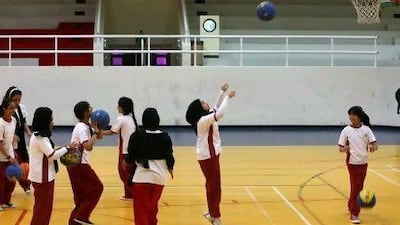DUBAI // Emirati children dreaming of leaving their mark on the world sports stage have been given a boost with a multimillion-dirham project by the Ministry of Education and Olympic authorities.
The national state school programme, with a first-year budget of Dh10 million, will train children as young as seven in swimming, athletics, fencing, archery, shooting and gymnastics.
“Sports has long been ignored at government schools,” said Yousuf Al Serkal, vice president of the National Olympic Committee (NOC) and chairman of the Executive Office.
“Fifteen years ago the ministry started substituting sports with science classes. We started losing young people who had it in them to succeed in sports.”
Mr Al Serkal said sports clubs were the only outlet for students looking to take part, as government schools lacked facilities.
“We want to go back to a wider exposure of games to everyone,” he said.
Intensive interschool competitions to help teachers identify the top 3,800 performers will be part of the programme.
The best at school level will move on to represent their district, and outstanding athletes at the district level will be chosen for more coaching from experts, hopefully leading them to represent the UAE on a global platform.
“Everything of theirs will be taken care of. Their food, regime, health … everything,” said Hassan Lootah, head of the ministry’s physical education (PE) department.
Dh7 million has already been extended to schools to improve sports facilities.
Mr Al Serkal said the ministry would be given an annual budget, which was likely to increase in the years after.
NOC expects the first crop of Emirati athletes to be ready to make their presence felt on the world stage within 10 years.
The idea for the sports programme was conceived four years ago by Sheikh Ahmed bin Mohammed Al Maktoum, chairman of the NOC.
The Ministry of Education was brought in to work out the logistics for its introduction in schools, while sports councils developed the action plan.
The programme’s aims are to improve sports education in schools, create a competitive sports culture and provide rigorous and technical training for pupils who excel.
It was launched under the patronage of Sheikh Mohammed bin Rashid, Vice President and the Ruler of Dubai.
Mariam Abbas, 17, who won the silver medal in bowling at the 19th Arab School Games in Kuwait this year, said she would love to see more sports at school.
“I did get an opportunity to go and win,” Mariam said. “But I think more pupils need that chance and if they can improve the sports education at school that would make a lot of difference.”
Mr Al Serkal acknowledges success will not come overnight.
“We know government schools are not 100 per cent equipped to realise the goal immediately but there is an interest,” he said.
The physical education department was reinstated in 2010 after being shut down for three years.
The ministry has since tried to improve physical education and sports facilities on government campuses, but a shortage of teachers, trainers and proper infrastructure are still a challenge.
Salam Kareem, PE programmes coordinator at the ministry, said it would at first use community centres across the country to overcome the shortcomings at schools.
Amal Fawzy ElBssuny, a PE teacher at the Mariam School in Sharjah, said the programme would provide a lot of encouragement to pupils.
“In our school competitions we will be handing out medals,” said Ms ElBssuny, who is a swimming coach. “When they know they are being awarded for their efforts they will work harder.
“Unfortunately, we do not have our own swimming pool and that makes it very difficult sometimes to provide extra classes.”

